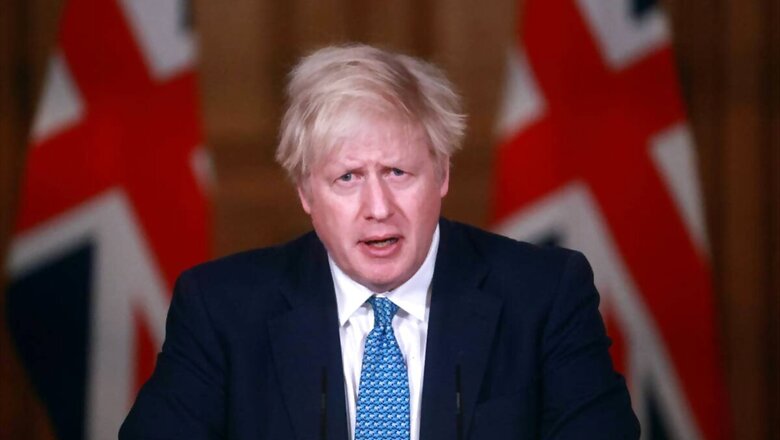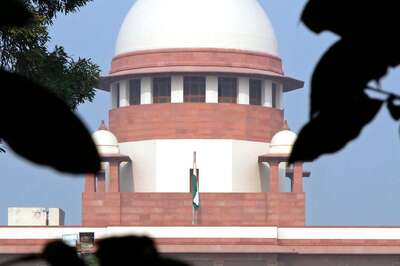
views
Boris Johnson ‘hands back’ Kohinoor, new chapter in India-Britain relations.
This is the headline that Indians are hoping for, but may not get to see at least in the foreseeable future. What’s more, Britain remains thick-skinned enough to publicly display Indian treasures whisked away unlawfully during the colonial rule.
“A 2018 study estimated that the resources drained from India by the UK alone were (worth) as much as $45 trillion by current value,” notes External Affairs Minister Dr S Jaishankar in his book, The India Way: Strategies for an Uncertain World. “Nevertheless, imperialism produced a history accepted in many quarters even today that British rule was somehow beneficial to Indians,” he adds.
All the same, Gandhi’s India ignored such ‘trivia’ in consenting to join the Commonwealth of Nations — a group of former British colonies, presided over by the British sovereign itself. And now, on April 25, India is readying a red-carpet welcome for her ‘son-in-law’, Prime Minister Boris Johnson — his first wife’s mother was of Indian-origin — who wants to turn over a new leaf in bilateral ties.
Both his predecessors, Prime Ministers David Cameron and Theresa May, had expressed similar sentiments during their terms in office. Cameron, who was in the saddle for six years till June 2016, did try to walk the talk. During one of his three official visits to India in 2013, he brought along the largest business delegation. He wanted to build a “modern partnership – not one tinged with colonial guilt”. Addressing the largest-ever gathering of the Indian diaspora in the UK at Wembley Stadium in November 2015 along with Prime Minister Narendra Modi, he “envisaged a British-Indian entering No 10 Downing Street as PM one day”.
That possibility no longer looks as remote with Boris Johnson at the helm since July 2019. In a first, three individuals of Indian-origin occupy key Cabinet positions — Chancellor of Exchequer (Finance Minister), Home Secretary (Minister) and President of COP26. Chancellor is second in line after the Foreign Secretary to take charge of the government in case of Prime Minister’s indisposition. The 1.5-million-strong Indian diaspora in England infuses both vitality and friction in the relations.
So what has changed now? Several things. A cautious British attitude towards China — due to the latter’s excessive belligerence, alleged cover-up of coronavirus-related information, repudiation of the Hong Kong agreement and human rights abuse in Xinjiang — Brexit and the rise of India.
Post-Brexit Britain had instituted the most comprehensive Integrated Review of Security, Defence, Development and Foreign Policy since the Cold War; it was tabled in the House of Commons on March 16. It describes China as a “systemic challenge”, but as stated by PM Johnson the same day, England will “also work with China where that is consistent with our values and interests, including building a stronger and positive economic relationship”. These mixed signals typify Britain, which instinctively wants to have the cake and eat it too. But that is a cross for Britain to bear and India to remember.
The review further seeks “reinvigoration of our historical relationship with India”. It envisages a shift of focus towards countries including India, Japan and Australia. Johnson was delighted to announce that he “will visit India next month to strengthen our friendship with the world’s biggest democracy”. Of course, we should welcome the stated objective and work with Britain to actualise the vision, to the extent possible.
Our canvas of cooperation is quite wide, encompassing areas such as trade investments, climate change, health, education, defence and security, cyber security, tourism, culture and strong people-to-people ties. India has already emerged as the third, if not the second-largest, investor in England, generating at least 110,000 jobs. The TATA Group of Companies is the largest employer among foreign conglomerates.
The UK accounts for about 6% of the total FDI (foreign direct investment) received by India at $29.56 billion (till September 2020). Two-way trade (goods and services) has been at around $24 billion. Britain is keen to conclude a free trade agreement (FTA) with India — which may be a tall order, given the overcautious Indian bureaucracy and competition-shy Indian industry. With this attitude, how India will become a part even of the regional supply chains remains a mystery.
Nevertheless, a decision to commence negotiations on an early harvest agreement could be announced. Significantly a 10-year roadmap for constructing a strong edifice of bilateral partnership could also be adopted.
A promising new area is scientific collaboration where a lot of work is being done both on and under the radar. A great example is the AstraZeneca vaccine developed by the Oxford University that is being produced at the Serum Institute of India. India has already supplied 5 million doses of the vaccine to Britain, and more is in the pipeline.
The two sides are desirous of invigorating defence and security cooperation. An Acquisition and Cross-Servicing Agreement could be concluded, in addition to those, on military exchanges and exercises, training and port calls etc. Like other European countries, Britain, too, has discovered the criticality of a free, open and rule-based Indo-Pacific region.
Furthermore, the UK became a dialogue partner of ASEAN in January this year and wants to join the Comprehensive and Progressive Agreement for Trans-Pacific Partnership (CPTPP).
Unlawful possession of Indian treasures apart, Britain has certain blind spots, one of which is Pakistan. The bureaucracy, media and many politicians find it difficult to de-hyphenate Islamabad and New Delhi. Khalistani elements have a safe haven in England and so do Indian economic fugitives. It was ironical that the most undemocratic institution called the House of Lords decided to preach India on farm reforms recently.
Whether it would reinvent itself as ‘Global Britain’, or regress further into becoming a ‘Little England’, would rest solely on how adept London is in comprehending the geopolitical manuscript. India would tailor her game according to the cards dealt by Britain. Welcome Prime Minister Johnson!
Read all the Latest News, Breaking News and Coronavirus News here. Follow us on Facebook, Twitter and Telegram.




















Comments
0 comment